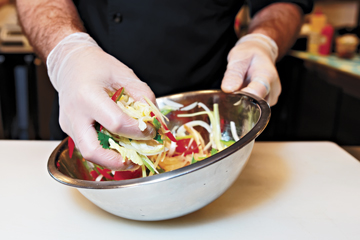By Dale Mayerson and Karen Thompson
If you are under the impression that food borne diseases are not common – think again. Today, food safety is receiving more and more attention, not only by nutrition experts, but also the government, the biomedical community and the public.
Food Safety is a concern at home, in restaurants and at Ontario’s Long-Term Care Homes. Each day, long-term care homes serve residents three full meals, between meal snacks, as well as food and drinks at special events and activities. With all that food being prepared and served every day, food safety must be a top priority, ensuring meals provide a safe and healthy experience for everyone.
What is food borne illness?
It is when sickness is caused by the ingestion of food containing microbiological, chemical or physical hazards. Although most of these infections cause only mild illness, severe infections, serious complications and death may occur in high-risk populations, such as in older adults and people with impaired immunity.
The most common causes of food borne illnesses in foodservice are:
- Inadequate/ineffective handwashing
- Improper cooling of foods
- Too much time between preparation and eating
- Infected people handling food
- Inadequate reheating
- Improper hot-holding temperatures
- Contaminated ingredients
- Food from unsafe sources
- Improper cleaning
- Cross contamination from raw to cooked products
- Inadequate cooking
A highly qualified team
Long-Term Care Homes have highly qualified teams of Registered Dietitians, Nutrition Managers, Cooks and Food Service Workers. A good goal is to have one hundred per cent of all staff employed in the Food and Nutrition department certified as Food Handlers by the local public health or other program recognized by public health such as the Train Can or National Food Safety Training Program. These programs require that staff write a test every 5 years to remain certified. Staff involved in any resident events or programs where food is prepared or served can benefit from being certified. As well many staff are College certified graduates of the Food Service Worker Program
Public Health – Partners in prevention
Public Health makes regular visits to Long Term Care kitchens and food preparation areas to ensure that they maintain a clean, safe, sanitary environment and that safe practices are used for receiving, storing, preparing and serving food in our homes.
Any concerns noted during these routine visits should be followed-up on immediately. As an extra safety measure, some homes may contract with a private laboratory to conduct independent reviews and food sampling.
Routine activities that promote food safety
Long term care homes promote many routine practices that ensure food safety. The following are just a few:
- Cleaning is a priority. The Food and Nutrition staff is trained on the correct use of cleaning chemicals and sign-off to verify that cleaning assignment have been completed. Staff routinely check and verify the concentration of chemicals used for washing dishes and cooking pots.
- Staff check and record temperatures for all:
Refrigerators and freezers twice daily
Foods at time of cooking
Foods at time of service
Dishwashing after each meal service
Pot washing several times each day
In addition, all food products are purchased from reliable suppliers that work closely with homes in identifying potentially hazardous food items that may need to be recalled.
What can friends and Families of residents do to help?
Friends and family can contribute to a resident’s quality of life and nutrition intake by providing familiar, well-liked foods that may not be available in the home. Here are a few tips for visitors to the home to ensure the safety and well-being of all residents:
DO
- Check with the home to ensure that hazardous foods (meats, eggs and dairy products) are allowed to be brought into the home for the resident’s consumption.
- Bring all cooked or prepared food for a resident to the Nutrition Manager, Registered Dietitian or Registered Nursing staff so they can assess suitability and ensure that they are labelled and stored safely
- Ensure personal refrigerators in the resident’s rooms are in proper working order and that they are cleaned out regularly. Discard items that are past their “best before” date.
- Use safe food handling techniques in preparing, packaging, storing and transporting food items
- Bring only enough food for the resident you are visiting to eat in a single sitting.
DO NOT
- Store food in the car. Go directly to the home.
– Share this food with other residents, as they may have food allergies or dietary restrictions.
- Put food in the resident’s drawers or leave extra food for them to consume later.
For more information on food handling, please speak with the Nutrition Manager or Registered Dietitian in the home, or contact Toronto Public Health. Please do your part to ensure a safe food environment is maintained!!!
Dale Mayerson B Sc RD CDE, and Karen Thompson, B A Sc RD are Registered Dietitians with extensive experience in Long-term care. They are coauthors of “Menu Planning in Long Term Care and Retirement Homes: A Comprehensive Guide” and have participated for many years on the Ontario Long Term Care Action Group, an advocacy group of Dietitians of Canada.


